La Patrie
When the worst of times become the best of times: a future for liberalism in Canada
Par Alfred Apps le 11 juin 2011
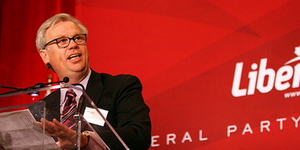 On May 2, 2011, the Liberal Party of Canada suffered the most devastating election defeat of its long and storied history. There can be no doubt about that.
On May 2, 2011, the Liberal Party of Canada suffered the most devastating election defeat of its long and storied history. There can be no doubt about that.
In terms of both elected members and voter support, Liberals swapped places with the NDP. And it all seemed to happen in one fell swoop over the last half of a very short campaign. No sooner had voters pronounced their judgment than the pundits were pontificating.
Election analysis: Bain de sièges
Par Pierre K. Malouf le 10 juin 2011
 Le Québec avait mal au Bloc, les Québécois ont choisi comme traitement de choc un bain de sièges NPD! Que les motifs de tout(e) un(e) chacun(e) de voter pour un candidat du NPD aient été justifiés ou farfelus (et certains étaient sans doute excellents aux yeux de ceux qui ont fait ce choix), le résultat est le même: nous voilà plus que jamais éloignés du pouvoir. Et représentés à Ottawa par des députés dont la majorité des électeurs ne partagent pas les convictions et ne connaissent pas le programme.
Le Québec avait mal au Bloc, les Québécois ont choisi comme traitement de choc un bain de sièges NPD! Que les motifs de tout(e) un(e) chacun(e) de voter pour un candidat du NPD aient été justifiés ou farfelus (et certains étaient sans doute excellents aux yeux de ceux qui ont fait ce choix), le résultat est le même: nous voilà plus que jamais éloignés du pouvoir. Et représentés à Ottawa par des députés dont la majorité des électeurs ne partagent pas les convictions et ne connaissent pas le programme.
Election analysis: Tories and NDP must deal with new pan-Canadian realities
Par Anja Karadeglija le 10 juin 2011
When Stephen Harper first appeared as a prime ministerial candidate, his opponents charged that he harbored a secret agenda, and the strategy helped Paul Martin’s Liberalsdefeat the fledgling Conservatives in the 2004 election. Seven years later – five of them with Harper as prime minister – Canadians decided they liked Harper and his party enough to give him a majority, but the accusationsof a hidden agenda still haven’t disappeared.
Election analysis: The election: A chance for real hope and change
Par David Solway le 10 juin 2011
 On May 2 of this year, Canadians went to the polls and generated a set of electoral results that defied the collective wisdom of the nation’s pollsters, editors, political pundits and think tankers. Conservative Prime Minister Stephen Harper was given the majority government that had eluded him over the previous two election cycles—and a substantial majority it was. The best he could have hoped for, according to the commentariat, was yet another minority government presiding over a fractious, multi-Party House of Commons, with little chance of passing a Conservative budget and implementing Conservative legislation.
On May 2 of this year, Canadians went to the polls and generated a set of electoral results that defied the collective wisdom of the nation’s pollsters, editors, political pundits and think tankers. Conservative Prime Minister Stephen Harper was given the majority government that had eluded him over the previous two election cycles—and a substantial majority it was. The best he could have hoped for, according to the commentariat, was yet another minority government presiding over a fractious, multi-Party House of Commons, with little chance of passing a Conservative budget and implementing Conservative legislation.
Election analysis: What Harper hath wrought
Par Alan Hustak le 10 juin 2011
The True North is undeniably stronger for Conservative supporters following the recent election but is perhaps a little less free for those who believe that liberalism and social justice still matter.
The Harper government’s 15-seat majority puts an end to political uncertainty for the next four years. But the untimely collapse of the Liberal party leaves the country without a voice for non-dogmatic policies, a less invasive government and a fidelity to executive federalism.
Election analysis: Pourquoi le libéralisme est important
Par Beryl Wajsman le 10 juin 2011
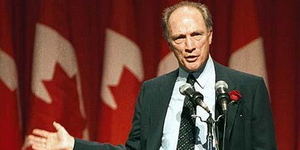 Il semble que l’élément le plus important à retenir de la dernière élection fédérale soit le supposé renouveau de la gauche. En fait, cet élément est un non-événement. Il n'y a pas eu de renouveau de la gauche. On tente ainsi de démontrer que le succès du NPD est d’abord un phénomène québécois enveloppé dans une «énigme» du Québec. On tente aussi de nous faire croire que ces élections signifient un pays divisé et désespérément polarisé entre une droite récalcitrante et une gauche autocrate. Et pourtant, les raisons sont toutes autres : la fatigue des Québécois pour la séparation et l’incapacité pour les libéraux de rallier les Canadiens à travers un message authentique.
Il semble que l’élément le plus important à retenir de la dernière élection fédérale soit le supposé renouveau de la gauche. En fait, cet élément est un non-événement. Il n'y a pas eu de renouveau de la gauche. On tente ainsi de démontrer que le succès du NPD est d’abord un phénomène québécois enveloppé dans une «énigme» du Québec. On tente aussi de nous faire croire que ces élections signifient un pays divisé et désespérément polarisé entre une droite récalcitrante et une gauche autocrate. Et pourtant, les raisons sont toutes autres : la fatigue des Québécois pour la séparation et l’incapacité pour les libéraux de rallier les Canadiens à travers un message authentique.
Election analysis: Post election blues: Splitting hairs on vote splits
Par Johannes Wheeldon le 10 juin 2011
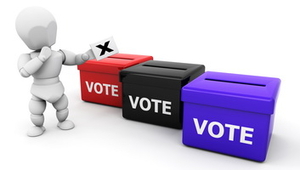 One of the outcomes of the 2011 Federal election has been interest in how Liberal and NDP voters split the progressive vote, and thus paved the way for a conservative majority. Shouldn't it be easy to understand what role vote splitting played in the 2011 election? Well, yes. And no.
One of the outcomes of the 2011 Federal election has been interest in how Liberal and NDP voters split the progressive vote, and thus paved the way for a conservative majority. Shouldn't it be easy to understand what role vote splitting played in the 2011 election? Well, yes. And no.
Election Analysis: Les dépendantistes
Par Éric Duhaime le 10 juin 2011
La déconfiture du Bloc québécois après l'election pose la question de la survie du parti. Le Bloc est-il mort? Avec seulement quatre députés ayant survécu au naufrage, la reconstruction s’annonce périlleuse, voire impossible.
Election analysis: Better voter representation system needed
Par Duff Conacher le 10 juin 2011
 The $2 per-vote annual subsidy for parties is the most democratic part of the federal political finance system, because it is based on the fundamental democratic principle of one-person, one-vote. While it should be changed to make it more democratic it will be very undemocratic to cut it to zero as the Conservatives propose.
The $2 per-vote annual subsidy for parties is the most democratic part of the federal political finance system, because it is based on the fundamental democratic principle of one-person, one-vote. While it should be changed to make it more democratic it will be very undemocratic to cut it to zero as the Conservatives propose.
Election analysis: No more room in between right and left?
Par David-Éric Simard le 10 juin 2011
We have just witnessed several surprising political upheavals that have changed the Canadian political landscape. Is this ephemeral, or the path we are set on for the next generation? Despite the passage of a few weeks to take it all in, it is still hard to believe that we now live under a majority Conservative government. For many people, it’s difficult to clearly see what has changed and where our country is headed. In our immediate environment, Quebec’s political map has been painted NDP orange while most of Canada’s other regions are now Conservative blue. This clear distinction leaves many of us wondering whether there’s still a place for Liberal red and the Bloc’s light blue on the political horizon beyond the next four years.
Why liberalism matters
Par Beryl Wajsman le 4 mai 2011
The biggest story about the supposed resurgent left in this election is that there is no story. Nor is there a resurgent left.
What most current discussion misses in covering the NDP is that the party's success was an overwhelmingly Quebec phenomenon wrapped in a Quebec enigma. It had nothing to do with a nation divided against itself hopelessly polarized between a recalcitrant right and a statocratic left. It had everything to do with Quebecers fatigue with separation and Liberals failure to connect with Canadians through an authentic message.
Décision 2011: Des élections inutiles ?
Par Pierre K. Malouf le 21 avril 2011
Il paraît que la majorité des Canadiens ne voulaient pas de nouvelles élections fédérales. Les voilà mis devant le fait accompli. MM. Ignatieff, Layton et Duceppe en voulaient, eux, de nouvelles élections, et Stephen Harper aussi, d’ailleurs, ne soyons pas naïfs. M. Harper a volontairement poussé ses adversaires dans leurs derniers retranchements, il a atteint son but. Les Conservateurs ne demandaient rien d’autre que d’être renversés, ils l’ont été. M. Harper a bien manoeuvré et compte bien faire élire le 2 mai prochain un gouvernement conservateur majoritaire. Aussi ne pouvons-nous le prendre au sérieux quand il affirme que ces élections sont «inutiles».
Décision 2011: Canadian Politics X
Par Akil Alleyne le 21 avril 2011
The bell has been rung, and the Tories, Grits, Dippers and Blocquistes are going another round in their bout for parliamentary supremacy. The ruling Conservatives, of course, are hoping that in their five-year quest for a majority government, the third time will prove to be the charm. Yet from the campaign’s outset, there has been one factor the Tories have lustily exploited, one having little to do with their actual fitness to govern. I refer to the specter of another coalition of Opposition parties snatching the reins of power from Tory hands.
Décision 2011: Key races to watch in central Montreal
Par Dan Delmar le 21 avril 2011
Outremont - Jeanne-Le Ber - Westmount-Ville Marie - Mont Royal - Notre-Dame-de-Grâce – Lachine
Décision 2011: Are they all statists?
Par George Jonas le 21 avril 2011
During the chummy pre-election weeks, politicians and their handlers are flirtatious but gun-shy. Journalists, viewed with grave misgivings, are being handled gingerly. The ambiance is ostentatiously egalitarian. The leaders’ aides refer to their bosses as Hollywood studio execs do to all-powerful movie moguls: First names, uttered in deferentially hushed tones.
Paying for Democracy
Par Robert Presser le 21 avril 2011
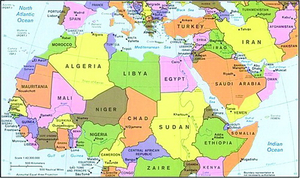 The revolutions taking place across Arabian North Africa are astounding for the rapidity with which they overthrew longstanding dictatorships and the confusion they provoked in Western governments. The US, UK, France and Germany had to decide when and how they would abandon the leaders they had backed for decades, and in the case of Libya the first coalition of the willing since the 1991 Gulf war was created to pound Gaddafi’s forces into retreat to allow the rebels to retain Benghazi.
The revolutions taking place across Arabian North Africa are astounding for the rapidity with which they overthrew longstanding dictatorships and the confusion they provoked in Western governments. The US, UK, France and Germany had to decide when and how they would abandon the leaders they had backed for decades, and in the case of Libya the first coalition of the willing since the 1991 Gulf war was created to pound Gaddafi’s forces into retreat to allow the rebels to retain Benghazi.
The image of eviction
Par Beryl Wajsman le 24 février 2011
 This is one of those stories without a good guy or a bad guy. Just victims. And the cushion of comfort between the fortunate and the vulnerable is filled with a good deal of luck.This past Monday morning I received an e-mail about an eviction. It was from a neighbor of the unfortunate tenant. By the time I arrived on the quiet block of duplexes in Cote St-Luc the bailiff and police had gone. All that was left were the worldly possessions of the tenant neatly stacked on the street as you can see in the picture.
This is one of those stories without a good guy or a bad guy. Just victims. And the cushion of comfort between the fortunate and the vulnerable is filled with a good deal of luck.This past Monday morning I received an e-mail about an eviction. It was from a neighbor of the unfortunate tenant. By the time I arrived on the quiet block of duplexes in Cote St-Luc the bailiff and police had gone. All that was left were the worldly possessions of the tenant neatly stacked on the street as you can see in the picture.
A wake up call for Quebec
Par Beryl Wajsman le 21 février 2011
Conservative MP Maxime Bernier’s weekend comments calling Bill 101 unnecessary are a clarion call of courage and candour. We should be rallying around those sentiments. Bernier spoke truth to myth and emerged as a new patron saint of reason. He should be lionized not vilified as he has been in much of the Quebec press. He has opened the door to a much needed debate on a heretofore taboo subject. It is a wake up call for this province and perhaps a last chance to turn Quebec toward the politics of respect, justice and equality.
Notre nombril: Sommes-nous moralement supérieurs aux Américains?
Par Pierre K. Malouf le 16 février 2011
Dimanche, 9 janvier 2011, 17 heures. Les nouvelles à RDI. À quel événement Radio-Canada donne-t-il la priorité ? Choix de réponses:
Le rapport Payette: Un autre affront à la liberté d'expression
Par Beryl Wajsman le 16 février 2011
Au-delà d’un an, Dominique Payette, une ancien journaliste et maintenant professeure à l'Université de Montréal, a été mandatée par la Ministre de la culture Christine St-Pierre pour étudier des façons dont les médias dans les régions du Québec et les médias indépendantes dans les villes pourraient être aidés à l’ère des nouvelles technologies. Son rapport final, présenté la semaine dernière, est allé bien au-delà de son mandat. En fait, c'est le plus grand affront à la liberté d'expression depuis les lois linguistiques. Ça mérite un rejet retentissant.
Revenge of the nerds
Par Dan Delmar le 16 février 2011
 I was wrong. Almost exactly two years ago, I wrote in these pages that, as a proud journalist, I would be boycotting Twitter and limiting my use of Facebook. I argued at the time that traditional forms of media could remain competitive with social media if they simply fought back andput out a more entertaining product.
I was wrong. Almost exactly two years ago, I wrote in these pages that, as a proud journalist, I would be boycotting Twitter and limiting my use of Facebook. I argued at the time that traditional forms of media could remain competitive with social media if they simply fought back andput out a more entertaining product.
Boycott this!
Par Beryl Wajsman le 16 février 2011
Ainsi, une partie des puissantes forces "progressives" du Québec ont décidé de boycotter les produits et les compagnies israéliens en raisonde « l’apartheid politique" d'Israël. Simplement de l’hypocrisie et une ruse. Par leurs mots et leurs actions elle a démontré, en folie et en honte, le vrai visage de cette partie de la société « civile » du Québec qui tout en déclarant hardiment sa propre « différence », est vraiment hanté par un doute de soi-même poussé par une jalousie des croyances individuelles des autres.
Les souliers d’Amir
Par Éric Duhaime le 16 février 2011
Le député de Québec solidaire, Amir Khadir, ne fait pas que lancer des souliers. Il les boycotte!
Au cœur de son comté de Mercier, la boutique Le Marcheur a pignon sur la rue St-Denis depuis 25 ans. Yves Archambault y vend des chaussures venues des quatre coins du monde. Le 2 octobre dernier, Monsieur Archambault reçoit une «mise en demeure» d’une organisation radicale de gauche qui le menace de piqueter devant son commerce pour lancer un appel au boycott s’il continue de vendre des souliers fabriqués en Israël.
Le boycott sur St-Denis est un échec
Par P.A. Sévigny le 16 février 2011
Quand cinq députés fédéraux, les chefs du PQ et du Bloc québécois et un nombre de plus en plus important de députés provinciaux condamnent vos manifestations hebdomadaires comme étant « … totalement inacceptables dans une société démocratique» vous pourriez envisager de plier les banderoles et de rentrer à la maison. En date du samedi passé, ce semble être ce qui s'est avéré car les militants de PAJU (Palestiniens et Juifs unis) ne se sont pas présentés alors que presque 20 personnes se sont réunis devant Le Marcheur, le magasin de chaussures de la rue St-Denis de Yves Archambault, pour démontrer leur soutien au droit de l'homme d'affaires de la rue St-Denis de gérer sa propre entreprise et ont repris la rue. Une victoire après presque treize semaines.
Canada already knows a Muslim Sit-Com is not the answer
Par David Solway le 16 février 2011
CBS anchor Katie Couric recently went on record deploring the “bigotry” and “seething hatred” that Muslims are supposed to be facing in the U.S., and proposing a “Muslim version of the Cosby Show” as a remedy to this lamentable situation. Of course, Ms. Couric’s reading of America’s ostensible anti-Muslim attitude is total nonsense of the sort associated with the political delirium of the “progressivist” class. The American people on the whole are probably among the most tolerant to be found anywhere in the world, with the glaring exception of the scandal-mongering left that has falsely donned the egalitarian mantle.
Le Québec doit démissionner
Par Pierre K. Malouf le 27 décembre 2010
La société québécoise souffre de maux qui ne mettent pas sa vie en danger à brève échéance, mais qui lui causent des douleurs chroniques et des handicaps débilitants. Le Québec est un malade qui connaît ses symptômes mais qui n’ose pas nommer sa maladie, qui dispose dans sa pharmacie de tous les remèdes qui pourraient favoriser sa guérison, mais qui refuse de les avaler par crainte des effets secondaires, leur préférant des panacés qui agravent le mal au lieu de le guérir.
La CSST: Le mauvais tempérament de l’époque au Québec
Par Beryl Wajsman le 27 décembre 2010
Les événements en société sont connexes. Parfois indirectement. Parfois ils reflètent simplement le tempérament de l’époque. Mais c'est pour cette raison que ceux qui affectent ce tempérament, ceux qui ont un poste politique important, doivent être imputables quand ils pratiquent la politique de l'annulation.
The Confidence Game
Par Akil Alleyne le 27 décembre 2010
 In mid-November, I logged on to Facebook to be treated to the following status on the profile of a friend of mine: “What’s the matter, Harper? Afraid you’ll lose the confidence of the House if you put your Afghan war plans to a vote?” My immediate response—which I promptly posted as a comment on my friend’s status—was “Probably.” Stephen Harper’s Conservative government, of course, remains parked at “minority”, theoretically vulnerable to sudden death via a no-confidence vote in the House of Commons. Given this Damoclean threat to his political survival, Harper’s evasion of Parliament did not exactly take me by surprise. Nor was I especially taken aback at reports that the Opposition Liberals had quietly acquiesced in the Tories’ artful dodging. Michael Ignatieff’s Grits have so far struggled to create the “winning conditions,” if you will, for another federal election. Those efforts might not be helped by abandoning an honourable mission that a past Liberal government initiated in the first place.
In mid-November, I logged on to Facebook to be treated to the following status on the profile of a friend of mine: “What’s the matter, Harper? Afraid you’ll lose the confidence of the House if you put your Afghan war plans to a vote?” My immediate response—which I promptly posted as a comment on my friend’s status—was “Probably.” Stephen Harper’s Conservative government, of course, remains parked at “minority”, theoretically vulnerable to sudden death via a no-confidence vote in the House of Commons. Given this Damoclean threat to his political survival, Harper’s evasion of Parliament did not exactly take me by surprise. Nor was I especially taken aback at reports that the Opposition Liberals had quietly acquiesced in the Tories’ artful dodging. Michael Ignatieff’s Grits have so far struggled to create the “winning conditions,” if you will, for another federal election. Those efforts might not be helped by abandoning an honourable mission that a past Liberal government initiated in the first place.
These boots are made for walking…Supporters of store owner condemn Khadir's smears of Israel
Par P.A. Sévigny le 27 décembre 2010
 These boots are made for walking……and as far as Sharon Freedman and her friends are concerned, that’s just what they’ll do. On Christmas morning, at least a dozen homeless kids are going to get a stellar Christmas present, courtesy of Freedman and a few friends who want to let everyone know how a bit of Christmas charity speaks louder than anything Québec Solidaire’s Amir Khadir might have to say about a St. Denis store owner’s right to mind his own business.
These boots are made for walking……and as far as Sharon Freedman and her friends are concerned, that’s just what they’ll do. On Christmas morning, at least a dozen homeless kids are going to get a stellar Christmas present, courtesy of Freedman and a few friends who want to let everyone know how a bit of Christmas charity speaks louder than anything Québec Solidaire’s Amir Khadir might have to say about a St. Denis store owner’s right to mind his own business.
If the shoe fits…L’ignorance, la haine et le boycottage
Par Dan Delmar le 27 décembre 2010
Les boycotts sont souvent puérils et inefficaces. En politique extérieure, ils n’ont pas plus de valeur que le geste d’un enfant braillard qui interrompt le jeu et rentre à la maison avec son ballon. En matière de boycott, de nouveaux critères d'immaturité et d'ignorance viennent d’être tracés par Palestiniens et Juifs unis (PAJU), groupe soutenu par le député de Québec solidaire Amir Khadir.
Don’t let the name fool you: PAJU is a radical pro-Palestinian group that aims to unite Palestinian and Jews only in their hatred for the state of Israel and all those who, even passively, support it. Along with Khadir, they are working to transform St. Denis into what they call an “Apartheid-free zone.”
La crise d’Octobre: l’arbre qui nous cache la forêt
Par Pierre K. Malouf le 4 novembre 2010
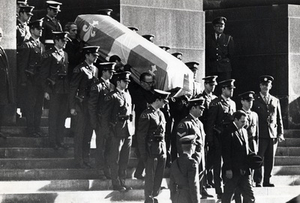 Déjà quarante ans ! Il fallait commémorer la crise d’Octobre. Les journaux, la télé, la radio ont fait oeuvre utile. Les survivants ont révisé leurs rôles, raccommodé leurs costumes, retouché leur maquillage, puis, devant un vaste parterre de journalistes et de commentateurs brandissant micros et caméras, ont récité et mimé des bribes de la tragédie qu’ils avaient improvisée il y a quarante ans. Quiconque a vécu ces événements et lu ce qui s’est dit et publié ensuite, ressort de l’exercice de cet automne avec une impression de déjà-vu. Pour ne parler que d’eux, que nous ont dit Jacques Lanctôt, Paul Rose, Robert Comeau, Marc Lalonde, Jérôme Choquette, Julien Giguère que nous ne savions déjà ? Qu’ont découvert les journalistes ? Quelles nouvelles pistes d’interprétation les commentateurs ont-ils tracées?
Déjà quarante ans ! Il fallait commémorer la crise d’Octobre. Les journaux, la télé, la radio ont fait oeuvre utile. Les survivants ont révisé leurs rôles, raccommodé leurs costumes, retouché leur maquillage, puis, devant un vaste parterre de journalistes et de commentateurs brandissant micros et caméras, ont récité et mimé des bribes de la tragédie qu’ils avaient improvisée il y a quarante ans. Quiconque a vécu ces événements et lu ce qui s’est dit et publié ensuite, ressort de l’exercice de cet automne avec une impression de déjà-vu. Pour ne parler que d’eux, que nous ont dit Jacques Lanctôt, Paul Rose, Robert Comeau, Marc Lalonde, Jérôme Choquette, Julien Giguère que nous ne savions déjà ? Qu’ont découvert les journalistes ? Quelles nouvelles pistes d’interprétation les commentateurs ont-ils tracées?
Les faits oubliés de la Crise d’octobre
Par Bernard Amyot le 4 novembre 2010
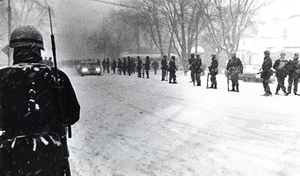 Il y a quarante ans le 5 octobre 1970, commençait la désormais célèbre Crise d’octobre avec l’enlèvement de James Richard Cross, diplomate britannique, par des terroristes du Front de libération du Québec (« FLQ »), prétextant agir au nom de la sécession du Québec et de la révolution marxiste. Le 10 octobre, ils enlevaient Pierre Laporte, fraîchement élu Ministre du travail du Québec, alors qu’il jouait au ballon avec son neveu dans la cour avant de sa maison de la rive sud de Montréal. Il sera assassiné par ses kidnappeurs 7 jours plus tard.
Il y a quarante ans le 5 octobre 1970, commençait la désormais célèbre Crise d’octobre avec l’enlèvement de James Richard Cross, diplomate britannique, par des terroristes du Front de libération du Québec (« FLQ »), prétextant agir au nom de la sécession du Québec et de la révolution marxiste. Le 10 octobre, ils enlevaient Pierre Laporte, fraîchement élu Ministre du travail du Québec, alors qu’il jouait au ballon avec son neveu dans la cour avant de sa maison de la rive sud de Montréal. Il sera assassiné par ses kidnappeurs 7 jours plus tard.
The October Crisis and the Destruction of the “Canayen” Culture
Par Graeme Decarie le 4 novembre 2010
The young professor snapped his pencil in half in an act of passionate drama. “We must define our culture,” he said. The heads of his colleagues nodded. They had to protect their culture, of course. And they were determined to do so. But first they had to figure out what it was.
Who are the victims of Quebec bashing?
Par Dan Laxer le 4 novembre 2010
Gilles Rhéaume and his Ligue Québécoise contre la francophobie canadienne are heading to the United Nations to ask the Human Rights Committee to denounce “Quebec bashing” as a form of racism, discrimination, and xenophobia.
Quebec: The most insecure province
Par Dan Delmar le 4 novembre 2010
Witnessing a hysterical Pauline Marois shrieking in the National Assembly a few days ago, describing the Québécois as a “petit people” could be interpreted as one of many signs that this province has lost its way; that it is the societal equivalent of a 13-year-old with adolescent angst and a desire to angrily lash out against authority figures.
Marois’ fit provided a rare moment of honesty and insight into the attitudes of Quebec’s sovereignist political class. The leader of the Parti Québécois wants to lead a small people – in numbers, surrounded by Anglo North America, yes – but does she also want to lead a weak people; lost, confused and distracted by the red herrings of petty linguistic squabbles?
























